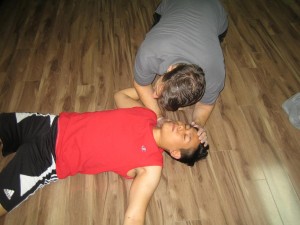A shock is a dangerous condition caused by insufficient blood flow in the body. Because of the lack of blood flow, critical organs such as the brain or lungs and the cells do not get receive oxygen and nutrients to properly function and may lead them to become damaged or cease functioning completely. Because of the severity of a shock, immediate medical attention is needed by the victim as the condition can worsen rapidly if not treated.
https://www.youtube.com/watch?v=iJX_L3yg05M&t=3s
Shocks come in different types and are caused by different reasons and conditions in the body, these include:
- Hypovolemic – caused by low blood volume.
- Cardiogenic – caused by heart problems.
- Neurogenic – caused by nervous system damage.

Check on the person if they are having any trouble breathing or in taking air. You may be required to perform CPR on the person. - Septic – caused by infections.
- Anaphylactic – caused by allergic reactions.
Signs and symptoms of someone experiencing shock:
- Extremely low blood pressure
- Anxiety which may lead to agitation or restlessness
- Confusion
- Discoloration of lips or fingernails to a bluish color
- Chest pain
- Dizziness
- Pale skin
- Little or no urination
- Rapid weak pulse
- Difficulty breathing
- Loss of consciousness
Note that medical attention is immediately required as soon as these symptoms appear as they can get worse over time if not treated, do not wait for these symptoms to worsen before you contact emergency medical help. If you notice these symptoms on a person, immediately call 911 for medical help. Check on the person if they are having any trouble breathing or in taking air. You may be required to perform CPR on the person. Continuously monitor the victim’s breathing until help finally arrives. If the victim has any wounds or illnesses, apply appropriate first aid.
Do not give the victim any oral intake, this includes food and drinks. If you suspect that the victim has a spinal injury, do not attempt to move the victim.
There are numerous methods in preventing a shock from happening, these include:
- Keeping your body healthy to avoid problems or complications, such as heart problems.
- Be aware of your surroundings to prevent accidents such as falls or injuries.
- Avoid dehydration.
- Always carry an epinephrine pen if you have a known allergy.
